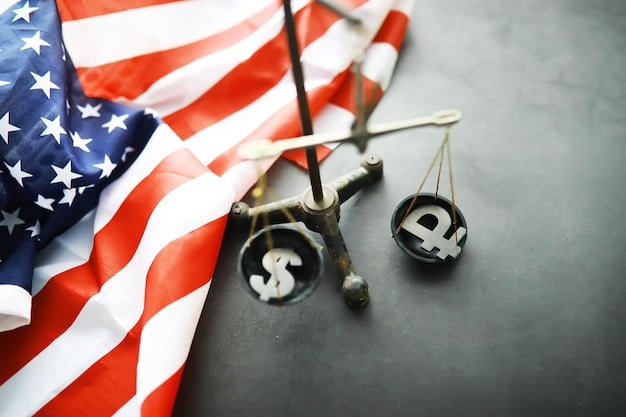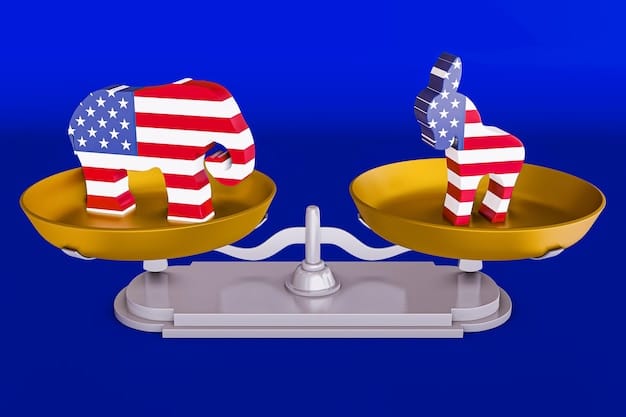Understanding the Implications of Recent Campaign Finance Law Changes

Recent changes to campaign finance laws can significantly impact election dynamics, potentially affecting who can contribute, how much they can donate, and the overall transparency and fairness of elections.
The landscape of campaign finance is constantly evolving, and understanding what are the implications of the recent changes to campaign finance laws is crucial for anyone interested in US politics. These changes can reshape how campaigns are funded, who has access to political power, and ultimately, the integrity of the electoral process. Let’s delve deeper.
The Evolution of Campaign Finance Regulations
Campaign finance regulations in the United States have a long and complex history, evolving in response to concerns about corruption, undue influence, and fairness in elections. Understanding this evolution provides crucial context for analyzing recent changes and their potential impacts.
Early Regulations and Landmark Cases
The first attempts to regulate campaign finance emerged in the late 19th and early 20th centuries, largely in response to concerns about corporate influence. Landmark cases like Buckley v. Valeo further shaped the legal framework.
The Bipartisan Campaign Reform Act (BCRA)
One of the most significant pieces of legislation in campaign finance history is the Bipartisan Campaign Reform Act of 2002, also known as McCain-Feingold. This law aimed to limit soft money contributions and regulate issue advocacy ads.
- BCRA’s limitations on soft money aimed to reduce the influence of large contributions to political parties.
- The act also included provisions regulating the timing and content of political advertisements.
- These regulations sparked considerable debate and legal challenges.
- The BCRA remains a controversial topic in discussions about campaign finance reform.
The historical context of campaign finance regulations reveals a continuous struggle to balance free speech rights with the desire for fair and transparent elections.

Key Provisions of Recent Campaign Finance Law Changes
Recent changes to campaign finance laws encompass a range of provisions that affect various aspects of political fundraising and spending. These changes can have far-reaching consequences for candidates, parties, and the overall political landscape.
Changes to Contribution Limits
One of the most common areas of change involves adjustments to contribution limits. These limits dictate how much money individuals, PACs, and other entities can donate to political campaigns and parties.
Regulations on Super PACs and Dark Money
Super PACs and “dark money” groups, which operate with limited transparency, have become increasingly influential in elections. Recent changes to campaign finance laws often address the regulation of these entities.
- Some regulations seek to increase disclosure requirements for donors to Super PACs.
- Other changes aim to limit the coordination between Super PACs and political campaigns.
- The impact of these regulations is often debated, with some arguing they are insufficient.
- Court challenges to these regulations are common, adding further complexity.
Understanding the specific provisions of recent campaign finance law changes is essential for assessing their potential impact on elections and political discourse.
Impact on Political Campaigns and Elections
The implications of recent changes to campaign finance laws extend to how political campaigns are conducted and how elections are ultimately decided. These changes can affect everything from fundraising strategies to the types of ads that are aired.
Fundraising Strategies
Changes to contribution limits and regulations on Super PACs can significantly alter how campaigns raise money. Candidates may need to rely more on small-dollar donors or adjust their strategies to comply with new rules.
Advertising and Political Messaging
New regulations on political advertising can affect the timing, content, and transparency of campaign ads. This can impact how candidates communicate with voters and shape public opinion.
Recent changes can also influence the types of advertising used, potentially favoring certain candidates or parties. The overall tone and content of political campaigns may also be affected. For example, if dark money groups are limited, we might see less negative campaigning.
The Role of Money in Politics: A Broader Perspective
Changes to campaign finance laws inevitably spark broader debates about the role of money in politics. These debates touch on fundamental questions about fairness, access, and the integrity of the democratic process.

Arguments for Regulation
Those who advocate for stricter campaign finance regulations often argue that they are necessary to reduce corruption, limit the influence of wealthy donors, and promote a more level playing field for candidates.
Arguments Against Regulation
On the other hand, opponents of campaign finance regulations often argue that they infringe on free speech rights and can stifle political expression. They may also argue that regulations are ineffective or have unintended consequences.
- Opponents believe that individuals and organizations should have the right to spend unlimited amounts of money to support their political views.
- Regulations can create barriers to entry for smaller campaigns and challengers.
- The definition of “corruption” and “undue influence” is subjective and open to interpretation.
- Ultimately, the debate over the role of money in politics reflects deep divisions about the nature of democracy and the balance between free speech and equality.
Understanding both sides of this debate is crucial for engaging in informed discussions about campaign finance reform.
Potential Unintended Consequences
It’s important to recognize that changes to campaign finance laws can sometimes have unintended consequences. These consequences can be difficult to predict and may undermine the original goals of the reforms.
Increased Use of Dark Money
One potential unintended consequence of stricter regulations on traditional campaign finance is the increased use of “dark money” groups, which operate with limited transparency. These groups can exploit loopholes in the law to influence elections without disclosing their donors.
Shifting of Funds to Other Areas
Another potential consequence is the shifting of funds to other areas of political activity, such as issue advocacy or lobbying. This can make it more difficult to track and regulate the flow of money in politics.
It is essential to carefully consider potential unintended consequences when evaluating campaign finance reforms. This requires a thorough understanding of the political landscape and the potential reactions of various actors.
The Future of Campaign Finance Law
The future of campaign finance law in the United States is uncertain, with ongoing debates about potential reforms and legal challenges. Several key issues are likely to shape the direction of future regulations.
Potential Reforms
One area of potential reform involves increasing transparency and disclosure requirements for political spending. This could include requiring Super PACs and other groups to disclose their donors.
Legal Challenges
Campaign finance laws are frequently challenged in court, with legal challenges often focusing on First Amendment rights to free speech. These challenges can significantly alter the legal landscape and shape the future of campaign finance regulation.
- The Supreme Court has played a major role in shaping campaign finance law through its decisions in cases like Citizens United.
- Future court decisions could further expand or restrict the scope of campaign finance regulations.
- The balance between free speech rights and the desire for fair and transparent elections will continue to be a central theme in these legal battles.
- As technology and campaign strategies evolve, new legal challenges are likely to emerge, requiring ongoing adaptation and interpretation of campaign finance laws.
The future of campaign finance law will depend on the interplay between political will, legal interpretation, and the evolving nature of political campaigns.
| Key Point | Brief Description |
|---|---|
| 💰 Contribution Limits | Regulations on how much individuals can donate. |
| 📣 Super PACs | Rules impacting independent expenditure groups. |
| ⚖️ Legal Challenges | Court cases shaping finance regulations. |
| 🗳️ Election Dynamics | Changes affecting campaign strategies and messaging. |
Frequently Asked Questions
▼
Campaign finance laws regulate the raising and spending of money to influence elections. They aim to promote transparency, prevent corruption, and ensure fair access to the political process.
▼
They are important to limit undue influence of wealthy donors by setting contribution limits. It promotes fairness and keeps campaigns transparent about how they’re funded.
▼
A Super PAC is an independent political committee that can raise unlimited sums of money from corporations, unions, and individuals but is not allowed to coordinate directly with political campaigns.
▼
“Dark money” refers to funds used to influence elections where the donors are not disclosed. These funds often come from non-profit organizations that are not required to reveal their contributors.
▼
They influence who can contribute, how much they can donate, and the overall transparency and fairness of the election process, impacting campaign strategies and voter information.
Conclusion
Understanding the implications of recent changes to campaign finance laws is essential for navigating the complex world of US politics. These changes can reshape the way campaigns are funded, influence how candidates communicate with voters, and ultimately impact the integrity of the electoral process. As these laws continue to evolve, staying informed is crucial for anyone who cares about the future of democracy in the United States.





